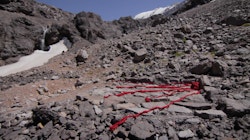Cecilia Vicuña in Kochi-Muziris Biennale
12 December 2022—10 April 2023
Group Exhibition at Kochi-Muziris Biennale, Kochi, India
Founded in 2011, Kochi-Muziris Biennale is India’s first ever biennial of international contemporary art and its story is unique to India’s current reality—its political, social and artistic landscape. It began as a government initiative, when the Department of Cultural Affairs of Government of Kerala approached two artists—Riyas Komu and Bose Krishnamachari—to help organize an international platform for art in India. The challenge was proportionate to the ambition of the project. A biennial had never gotten past the conceptual stage in India before. There was no existing infrastructure necessary for an exhibition of this scale...
Chilean artist Cecilia Vicuña's Quipu Mapocho (2017) follows the unravelled red thread of a quipu, an ancient system of knots used by Andean populations to record events and storytelling. The fabric floats alone along a melting glacier, as we hear sounds of mourning and distress interwoven with Vicuña's powerful performance and poetry.


A biennale can be so much more than a mere accumulation of coincidental collisions. As a bulwark against despair the biennale as commons may seem an impossible idea. But we remember the ability of our species, our communities, to flourish artistically even in fraught and dire situations, with a refusal in the face of disillusionment to disavow our poetry, our languages, our art and music, our optimism and humour. To envision this biennale as a persistent yet unpredictable murmuration in the face of capriciousness and volatility comes from my unshakeable conviction in the power of storytelling as strategy, of the transgressive potency of ink, and transformative fire of satire and humour.
What do we find when we listen, read, record, think and make? For one, that even the most solitary of journeys is not one of isolation, but drinks deeply from that common wellspring of collective knowledge and ideas. Even when we work alone, we amplify the voices of others, and this form of sociability is why when we create, we are collective.
This optimism in practice—in artistic and in collective work, especially in regional or local contexts and forms—includes questions like the possibly redemptive and revolutionary power of practice beyond the market. We see this reflected in growing investigative methods in cultural work that directly excavate and implicate the monetisation of everything—whether environment, activism, crisis, knowledge production and access, global capital flows and inequities. Our co-mingled virtual futures are inextricable from the transmission of knowledge, ideas and capital, and so too are we subject to neoliberal infiltration and control. Implicated is the concept of nation and inviolability of borders, a pernicious myth that denies the diffusion of languages and ideas, of storytelling and sharing. The difference here is the rejection of the narrative as singular, choosing instead an embracing of submerged and manifold stories, and where, how, and through whose agencies they diverge.
A commons, then, is not just an archive that holds in stasis till activated. It is prolific, shapeshifting, and impure. Here we can read and listen, here meaning and implication can be glimpsed, parsed, reinterpreted and so live on in the minds of others, an ever expanding, rerouting, mutating web. This web also reaches across narrow geographical, theological and political concerns—solidarity crosses over, solidarity in the shared ideal, whether it be free speech, free press, individual liberty, defining the true spirit of the law and jurisprudence, and the emancipation of people.
The intersections of people and incidents, flashpoints of censorship and sites, all point to the crucial importance of the political, cultural, literary, scientific and philosophical climate necessary for ideas to thrive and flourish. There is unsurprisingly no perfect concatenation of circumstances, times or epochal characteristics necessary for ground-breaking work, ideas or revolutions. The human need to think freely without proscription, in spite of, and sometimes because of repression, all point to the way we react to conflict. The only enemy is apathy. That has no name or face and it lies entwined with its bedfellow—self-censorship.
This edition of the Kochi-Muziris Biennale therefore embodies the joy of experiencing practices of divergent sensibilities, under conditions both joyful and grim. There is optimism even in the darkest absurdity, and this is what leavens the direness of our time. It is in the robustness of humour that we can imagine the possibility of sustained kinship, and remember that we are not isolated in this fight. And that perhaps all that is required for an impossible ideal to exist is for enough people to live, think, and work as if it already does.
— Shubigi Rao, Curator Kuchi-Muziris Biennale